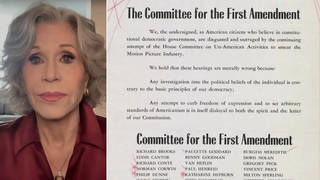
Topics
Guests
- Stephen Oleskeypartner in the litigation and real estate departments at the law firm WilmerHale. He represents six Guantanamo detainees.
- Emily Spielerdean of Northeastern University’s School of Law. She is the co-author of the deans’ letter condemning Stimson’s remarks.
A top Pentagon official last week urged U.S. corporations to boycott law firms whose attorneys represent detainees at the U.S. prison camp in Guantanamo Bay, Cuba. In a radio interview last week, Assistant Secretary of Defense for Detainee Affairs Charles “Cully” Stimson said companies might wish to shun firms that represent “the very terrorists who hit their bottom line back in 2001.” Stimson apologized after his remarks were condemned by the American Bar Association and deans from more than 130 law schools. We speak with the co-author of the law school petition and a corporate lawyer representing six Guantanamo prisoners. [includes rush transcript]
Transcript
AMY GOODMAN: A top Pentagon official has urged U.S. corporations to boycott law firms whose attorneys represent detainees at the U.S. prison camp at Guantanamo. Charles “Cully” Stimson, who is assistant secretary of defense for detainee affairs, spoke last Thursday to Federal Radio News on the fifth anniversary of the first prisoners being sent to Guantanamo. Stimson listed some of the most prestigious corporate law firms in the country that are providing free representation to prisoners and said companies might want to consider taking their business elsewhere, to firms that are not, quote, “representing terrorists.”
CHARLES STIMSON: As a result of a FOIA request through a major news organization, somebody asked, “Who are the lawyers around this country representing detainees down there?” And you know what? It’s shocking. The major law firms in this country — Pillsbury Winthrop, Jenner & Block, Wilmer Cutler Pickering, Covington & Burling here in D.C., Sutherland Asbill & Brennan, Paul Weiss Rifkin, Mayer Brown, Weil Gottshal, Pepper Hamilton, Venable, Alston & Bird, Perkins Coie, Hunton & Williams, Fulbright Jaworski, all the rest of them — are out there representing detainees, and I think, quite honestly, when corporate CEOs see that those firms are representing the very terrorists who hit their bottom line back in 2001, those CEOs are going to make those law firms choose between representing terrorists or representing reputable firms, and I think that is going to have major play in the next few weeks. It’s going to be fun to watch that play out.
JANE NORRIS: But clearly, Secretary, the attorneys who are representing the terrorist detainees, they are being paid by someone. I mean, there must be an organization that is funding this representation. Who is that?
CHARLES STIMSON: It’s not clear, is it? Some will maintain that they’re doing it out of the goodness of their heart, that they’re doing it pro bono, and I suspect they are. Others are receiving monies from who knows where, and I’d be curious to have them explain that.
AMY GOODMAN: That was Assistant Secretary of Defense for Detainee Affairs Charles “Cully” Stimson, speaking last week on Federal News Radio. The American Bar Association immediately condemned his remarks, calling them deeply offensive to the legal profession, and 130 U.S. law school deans signed a letter also condemning his remarks. The Pentagon has distanced itself from Stimson, saying he was not speaking for the Bush administration.
Now, Stimson has apologized for his remarks. In a letter to The Washington Post today, he writes, quote, “Those comments do not reflect my core beliefs.” He adds, quote, “I believe firmly that a foundational principle of our legal system is that the system works best when both sides are represented by competent legal counsel.”
Well, Stephen Oleskey and Emily Spieler join me now from Boston. Stephen is a partner in the litigation and real estate departments at the law firm WilmerHale. He represents six Guantanamo prisoners. Emily Spieler is dean of Northeastern University School of Law. She is the co-author of the deans’ letter condemning Stimson’s remarks. We invited a representative from the Pentagon to join us, but they declined our request.
I want to go first to Emily Spieler. You co-wrote with Harold Koh, the dean of Yale Law School, this letter. Can you talk about your core objections to what this top Pentagon official had to say?
EMILY SPIELER: Well, it is, in fact, true, as he said, apparently, in his letter today, that what he said goes against the very basic tenets of not only American, but also international, law in the role that lawyers should play, particularly in those cases in which there may be unpopular defendants who need competent legal counsel.
The drafting of the letter was actually not difficult. Dean Koh and I agreed quite quickly on what the letter should say. And what was astonishing was the rapidity of the response from deans across the country. This clearly struck a chord for all of us, I think, in terms of what is critical that we teach our students and stand for within the legal profession.
If we can’t encourage people to do these kinds of cases, in fact, the American legal system is in jeopardy. If we can’t tell our students that they should do this, it’s in jeopardy. If people in law firms feel that they’re taking risks by doing it, risks that will affect their bottom line, they won’t do it. And again, it goes to the core of our basic legal structure.
AMY GOODMAN: What about the issue that this top Pentagon official is raising: Who knows where these attorneys are getting their funding?
EMILY SPIELER: When we talk about pro bono work, we are in fact talking about firms making decisions internally to take on cases and provide representation for free. That is what pro bono work is. And most parts of the organized bar are extremely interested in seeing larger firms with greater resources step up to do more pro bono work, not less, both on unpopular — potentially unpopular cases, as well as in representation of people who simply can’t afford representation within our own domestic courts. So, I guess, to me, the notion that the administration or anyone who is in power would make decisions about what’s acceptable pro bono work and what isn’t is deeply troubling.
AMY GOODMAN: Stephen Oleskey, you’re a partner in the litigation and real estate department at WilmerHale. You represent six Guantanamo detainees. You are one of the law firms that this Pentagon official raised, that Stimson raised, in raising the possibility of boycott, though he has apologized now. What do you make of the apology? And talk about the case that you represent.
STEPHEN OLESKEY: I think the apology is deserved. Obviously, the remarks shouldn’t have been made. We have had, as habeas counsel, and there are about, I think, 500 of us now, to fight since 2002 to get the right to hearings for men in Guantanamo. They are — almost all of them there have never been charged with anything. They have never had any hearings. They have never had any trials. And the government has fought every step of the way to prevent those trials and hearings from taking place.
So, his remarks, his unfortunate remarks, really reflect at an operational level what we’ve been confronting as habeas counsel, which is the inability to have a basic principle of Anglo-American jurisprudence going back to the English common law vindicated in this case, which is that the king, or in this case the executive, can’t hold people indefinitely without charges or a trial. That’s what habeas corpus is all about. That’s why it’s in the United States Constitution in Article 1. That’s why it’s so important. That’s why the Supreme Court has twice said, in various ways, these men deserve to have hearings about their confinement.
And yet, these hearings have still not taken place. Our appeals are still in the federal system. And it appears at this moment that it’s a fair distance from today to such hearings. That’s very disturbing to anyone who believes in the American justice system, as most lawyers do. I hope all lawyers do, in fact.
AMY GOODMAN: What do you make of what Attorney General Alberto Gonzales said, blaming the delays in trying these prisoners at Guantanamo on you, on the lawyers — not you specifically — but saying the trials may start by this summer. Gonzales told the Associated Press this. He said rules for the military commission are being sent up by — up to Capitol Hill this week. He said, “It’s not for lack of trying,” when asked about the legal fate of the prisoners who have been held at the military facility, in some cases for five years. He said, “We’re challenged every step of the way.”
STEPHEN OLESKEY: The attorney general appears to be addressing the approximately 12 people who have been formally charged under what’s called a military commission system. Those people, ironically, in a sense, do have the right to a trial. As a result of the Hamdan decision last summer, the Supreme Court has required the government to write new rules, which the attorney general is referring to, for those trials. They’ll have cross-examination. They’ll have witnesses. They’ll have an appeal within the military system.
What that statement by the attorney general omits is that almost everyone else at Guantanamo has not been charged under that system, and therefore they’re people who, as Justice O’Connor said in 2004, are being potentially sentenced to indefinite life imprisonment without any hearing. The habeas counsel haven’t done anything to delay those hearings, which, as I noted earlier, haven’t been held and are still some distance from being held. We are the lawyers in the system advocating that there be trials so that guilt or innocence on some charge can be heard and decided.
AMY GOODMAN: Very quickly, Stephen Oleskey, can you talk about the six Guantanamo prisoners that you represent?
STEPHEN OLESKEY: Yes. My clients were living and working in Bosnia essentially as social workers after September 11. They were married. They had children. They were very much in the fabric of Bosnian society. They were arrested at the insistence of the United States, who said they were terrorists. The Bosnian legal system, which we established in the Dayton Accords in 1995, investigated them and reviewed them for 90 days. That system determined that there was not any evidence to hold them. They were ordered released by a court in Bosnia. An injunction was entered by a human rights court in Bosnia, preventing their being taken out of Bosnia. The United States demanded nonetheless that they be taken to Guantanamo, and the Bosnian government acceded to that demand. They’ve been there since January 20, 2005, which will be six years, starting in a couple of days. It’s been a very long five years for those six men.
AMY GOODMAN: They haven’t been charged?
STEPHEN OLESKEY: They have not been charged with anything. And, as I say, they should either be returned home, as many others have already been done by multilateral negotiations, by bilateral negotiations with the Bosnian government, in this case, or they ought to have habeas corpus proceedings, as our legal system has provided for hundreds of years.
AMY GOODMAN: The response of the government, not specifically in the case of the detainees you represent, but saying sometimes they want to send them home, but they don’t want them to be persecuted at home.
STEPHEN OLESKEY: That’s not an issue in Bosnia. It’s a multiracial society. The government was very carefully structured in the Dayton Accords to contain representatives of the Serbian, Croatian and Bosnian communities, and my clients would not be in any jeopardy if they are returned back to Bosnia, from which they were taken. The Bosnian government last year conceded in a letter to the secretary general of the Council of Europe that what happened was an illegal handover.
What we would like is a judge to look at that frank admission by the Bosnian government, to look at American law in light of that admission, and to determine whether there’s any further basis to hold these men. We believe there is not.
AMY GOODMAN: Dean Spieler, while this top Pentagon official did make these comments, he did take them back. Mr. Stimson did take them back. Do you think that there was a message being sent out?
EMILY SPIELER: Well, there certainly seemed to be. I think that the retraction was appropriate and needed. But the sense that there might be a chilling effect on the willingness of lawyers to take unpopular or difficult cases, because they might be under attack by the administration and they might find that their firms have some of their business jeopardized, is deeply troubling. And I think that the retraction is important, but the alacrity with which the organized bar, the American Bar Association, and also law deans responded is partly a reflection of the need for this continued response. You know, I think, fear, perhaps hope, that the retraction was a result of the response, but on the other hand, the statement should never have been made. And it’s important that those of us who are leaders within the legal community continue to be vigilant on this issue.
AMY GOODMAN: And very quickly, the last point that Stimson made, the questioning of possibly where some of the money might come from to support this so-called pro bono work, do you think there are suggestions of investigations of law firms?
EMILY SPIELER: That certainly sounded like what was being suggested, or that there should be a cloud over these law firms as a result of this suggestion, and I think that that’s abhorrent.
AMY GOODMAN: Do you think, Dean Spieler, that the Guantanamo prison should be shut down?
EMILY SPIELER: You know, I don’t know as much as Mr. Oleskey does about the substance of this debate, and I would prefer to defer to him on that question. I think it’s critical that America, the United States, adhere to international norms within the international community.
AMY GOODMAN: On that note, we’re going to have to leave it there. Dean Spieler, thanks for joining us — Stephen Oleskey, as well.












Media Options